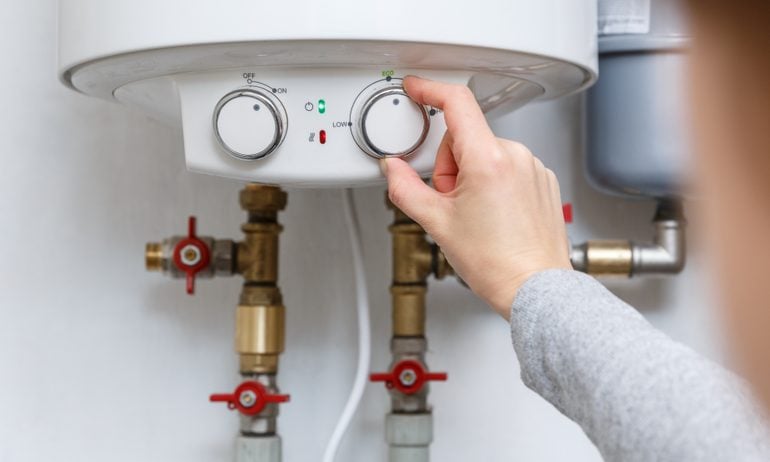Why Is My Water Heater Leaking? 7 Common Reasons
Water heater leaks can cause a lot of damage in your home. Here are the common causes and ways to prevent them.

Some or all of the mortgage lenders featured on our site are advertising partners of NerdWallet, but this does not influence our evaluations, lender star ratings or the order in which lenders are listed on the page. Our opinions are our own. Here is a list of our partners.
Water heater leaks can come from a number of causes, including cracks from tank corrosion, mineral and sediment buildup, corrosion of internal parts, loose or broken valves, leaky connections and overly high water pressure.
How do hot water heaters work and how long do they last?
Standard water heaters hold from 20 to 80 gallons of water, and they work by releasing heated water from the top of the tank when you turn on a hot water faucet. Then, to replace the released hot water, cold water enters the system through a dip tube at the bottom of the tank. This ensures the water heater is always full.
Traditional water heaters for single-family homes typically last 10-12 years, and heat pump water heaters can last as long as 13-15 years.
Water leaking from a water heater means there’s a problem that needs immediate attention. You may need to repair or replace the unit (or the malfunctioning part) before the water heater becomes further damaged or causes water damage to your home.
Many home security systems offer sensors that detect leaks. Check out our picks for the year's best home security systems.
7 common causes of water heater leaks
Water heater leaks can stem from a variety of causes, some serious and some easily repaired. Here are the most common:
1. Tank corrosion cracks
As water heaters age, rust can corrode the inside of the tank, creating cracks that cause the tank to leak. You may be able to patch small cracks as a short-term fix, but you’ll need to replace the water heater before too long.
2. Tank cracks from mineral buildup
Certain water heaters come with a third glass-lined tank. With this type of unit, hardened minerals may form deposits during temperature fluctuations, causing cracks in the glass, which lead to water leakage. When this happens, you’ll need to replace the glass-lined tank, or if your water heater is nearing the end of its life, opt for a new unit.
3. Tank cracks from sediment buildup
Poorly maintained water heaters can crack from sentiment that accumulates at the bottom of the tank. Once you see this type of leak, which can be from mild to severe, you’ll need to replace the unit.
4. Anode rod corrosion
The anode rod helps attract and remove corrosive materials from inside the water tank. However, the corrosive materials can also corrode the anode rod to the point where it’s almost gone. When the anode rod has deteriorated to that extent, the tank becomes more vulnerable to cracks and leaks — and a leak can form in the space the anode rod used to fill. Monitoring the condition of the anode rod and replacing it as needed can extend the useful life of your water heater.
5. Loose drain valve
The drain valve is a valve you can use to empty and clean the water heater. It may loosen over the years from continuous use, causing leaks. You may be able to fix the leak by tightening the valve; however, in some cases, replacing the valve may be necessary.
6. Loose inlet and outlet connections
The inlet and outlet connections, which allow cold water to flow into the tank and hot water to flow into your home's fixtures, can loosen over time, resulting in leaks near the top of the tank. Tightening the connections (or having a plumber do so) typically resolves this issue.
7. Overly high pressure and/or malfunctioning pressure-relief valves
Water heaters can leak when overly high pressure leaves water nowhere to go but out through cracks. Common causes of elevated pressure in water heaters are high temperature (water expands when heated) and pressure valves that malfunction or become loose. If this is the case with your water heater, tightening the valve may solve the problem, or the valve may need to be replaced.
What to do if your water heater is leaking
If your water heater is leaking, there are two steps you can take immediately to prevent injuries and damage to your home:
Shut off the water supply to the water heater. Your water heater may have a shut-off valve; if it doesn’t, you’ll need to use your home’s water shut-off valve.
Shut off the power supply to your water heater. If you have a gas water heater, shut off the gas supply line to the unit. For an electric water heater, turn off the breaker on your electrical panel.
Once these safety measures are in place, then, you can try to determine where the leak is coming from and if you should call in a professional.





